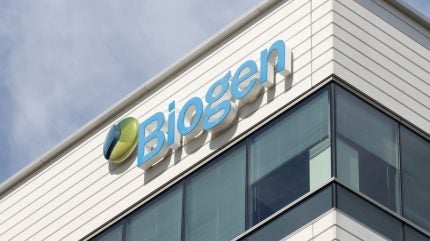
A high-dose version of Biogen’s Spinraza (nusinersen) could soon be available in Europe, after a panel recommended the formulation’s approval.
Spinraza is already approved in multiple regions, including Europe, at a dose regimen of 12mg for the treatment of 5q spinal muscular atrophy (SMA), a rare neurological disorder.

Discover B2B Marketing That Performs
Combine business intelligence and editorial excellence to reach engaged professionals across 36 leading media platforms.
The European Medicines Agency’s (EMA) Committee for Medicinal Products for Human Use (CHMP) has now issued a positive opinion for the new higher-dose formulation.
The decision for approval recommendation will now be passed to the European Commission (EC) for a final review, with a decision expected in January 2026.
The committee based its decision on data from the Phase II/III DEVOTE study (NCT04089566) and its ongoing long-term extension, which evaluated the drug in patients who were treatment-naïve or previously treated with the approved 12mg dosing regimen. Patients from both groups experienced improvements in motor function, as measured by various paediatric and adult scales.
The high-dose regimen comprises a loading regimen of two 50mg doses 14 days apart and a maintenance regimen of 28mg every four months for treatment-naïve patients.

US Tariffs are shifting - will you react or anticipate?
Don’t let policy changes catch you off guard. Stay proactive with real-time data and expert analysis.
By GlobalDataThe high-dose regimen was generally well tolerated, with reported adverse events consistent with SMA and the drug’s known safety profile, according to Biogen.
The CHMP approval marks a different course of direction when compared to the US Food and Drug Administration (FDA), which declined to approve the high-dose version in September 2025. The agency requested an update to the technical information be included in the Chemistry Manufacturing and Controls (CMC) module of the application.
SMA is a rare genetic condition causing progressive muscle weakness due to degeneration of motor neurons in the spinal cord. 5q SMA is the most common form of the disease and represents approximately 95% of all SMA cases.
Biogen’s head of development Priya Singhal said: “While we’ve seen great progress over the past decade, there is urgency to do more to address the clear unmet needs of the SMA community.
“The CHMP’s positive opinion for the high dose regimen of Spinraza represents a promising advancement in our commitment to support the evolving needs of individuals living with SMA and deliver therapies that can enhance patient outcomes.”
Spinraza was one of Biogen’s top-selling drugs in 2024, generating global sales of $1.57bn. It was only beat by multiple sclerosis drug Tysabri (natalizumab), which brought in $1.72bn in global sales in 2024 for the company.
However, Spinraza is facing pressure from Roche’s oral Evrysdi (risdiplam) and Novartis’ one-time gene therapy Zolgensma (onasemnogene abeparvovec). In a comparative study published in JAMA, Zolgensma was found to have a lower incidence of unsatisfactory clinical response (UCR), suggesting it might have the potential to outperform Spinraza in terms of efficacy.




